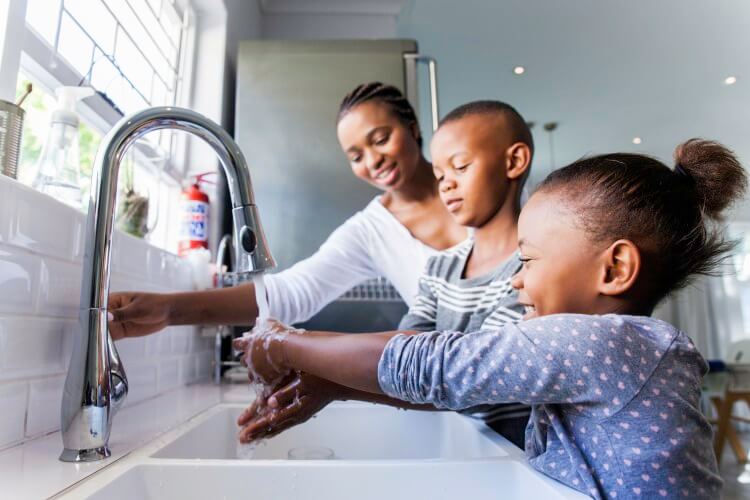Tips for Good Hand Hygiene
- Category: Living Well
- Posted On:
Happy National Handwashing Week! We’re full swing into flu season, so it’s more important than ever to make sure you’re washing up to stay well for all the holiday celebrations to come. Hand hygiene is the single most important thing you can do to maintain your health, adopting this habit now will play a major role for your quality of life now and in the future.
Washing your hands regularly with soap and water can protect you from many illnesses caused by viruses and bacteria. Washing removes germs you pick up when you touch people, animals, or surfaces. If not removed, these germs get into your eyes, nose, or mouth and cause illness.
It is important to wash your hands regularly throughout the day and it is essential to wash:
- Before touching any food or eating
- After using the bathroom
- After handling animals or animal wastes
Effective Hand Washing Technique
Follow these five steps every time.
- Wet your hands with clean, running water (warm or cold), turn off the tap, and apply soap.
- Lather your hands by rubbing them together with the soap. Lather the backs of your hands, between your fingers, and under your nails.
- Scrub your hands for at least 20 seconds. Need a timer? Hum the “Happy Birthday” song from beginning to end twice.
- Rinse your hands well under clean, running water.
- Dry your hands using a clean towel.
Handwashing in the Community
Studies consistently find that less than 60% of people practice hand hygiene after using the bathroom. After using the bathroom, the number of bacteria on our finger tips doubles. That means any person you come in contact with, or surface they’ve touched, can be contaminated with a host of viruses and bacteria that cause a bunch of nasty diseases. For children, handwashing has a huge impact on school absenteeism. When they consistently wash their hands, children miss about 24% fewer days due to respiratory illness and 50% fewer days due to upset stomach.
Children and Hand Hygiene

Children are particularly susceptible to serious infections that are spread by viruses and bacteria. Pneumonia, which can result from respiratory illness, is the number one cause of childhood death. Children have the tendency to put their hands in their mouths, so it is important to wash their hands regularly even if they are not feeding themselves. To wash a baby’s hands you should follow the same hand washing protocol you use for yourself: Lather soap with warm water, making sure to clean between their fingers and under their finger nails, and then dry completely with a clean paper or cloth towel.
Handwashing FAQ
How long do I actually have to wash my hands?
The short answer here is 15 seconds. The CDC recommends 20 seconds. The effectiveness of washing your hands depends on how dirty your hands are and how well you lather and scrub. If you have to make a choice it’s better to scrub vigorously for 15 seconds than lightly for 20 seconds.
How should I dry my hands?
Damp hands are significantly more likely (about 1000 times more likely) to spread leftover viruses and bacteria than hands that are properly dried after washing. Make sure you are using a single-use towel to completely dry your hands. It does not make a difference if you dry your hands with a cloth or paper towel as long as it has not been used before.
What about hand sanitizer?
Hand sanitizer is a good option if your hands aren’t visibly soiled with dirt or other substances. Make sure you cover all of your hands and allow the sanitizer to dry without wiping or rinsing it off.
What do I get from washing my hands?
You will avoid every 5th respiratory infection if you habitually wash your hands. That means 20% fewer colds throughout your life. That 20 seconds at the sink can save you a week in bed.


